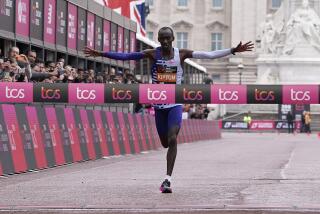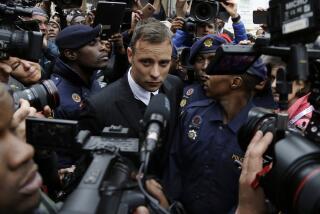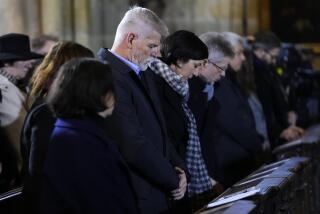Zatopek laid to rest as an enduring Czech hero
What he did was incredible. In all, Emil Zatopek won five Olympic medals. At the Helsinki Olympics in 1952, he won all three of track’s longest events--the 5,000 meters, 10,000 meters and the marathon.
What he endured is unthinkable. In 1968, Zatopek, a national hero, had the audacity to speak out when Soviet tanks crushed the blossoming Czech democracy movement. He was then made an exile in his own land. He was consigned first to manual labor at a uranium mine, then demoted further and told to drive a truck for the Prague sanitation department.
How he endured is an inspiration. He remained quiet, unassuming, humble. And when his life was celebrated Wednesday, it was in a ceremony at Prague’s gilded 19th-century National Theater that said as much about the man as it did the changes in a nation--no longer Communist Czechoslovakia, now the democratic Czech Republic--that once again reveres him as a legend.
In a simple production touched with melancholy music from a traditional Czech folk band, politicians, diplomats and sports personalities from around the world paid tribute to Zatopek, who died Nov. 21 after a stroke. He was 78.
The audience was also filled with athletes, public officials, friends and actors; the crowd packed all five levels of the theater. Outside, on a gray and cold day, hundreds more watched the ceremony on a big-screen TV. It was broadcast live throughout the Czech Republic.
Even with the passage of years, International Olympic Committee President Juan Antonio Samaranch told the crowd, he remembered “very well” the moment Zatopek entered Helsinki’s Olympic Stadium an obvious winner in the 1952 marathon.
Samaranch’s observation point for this drama in 1952 was from the press gallery. At the time, he was a 32-year-old sportswriter for a Barcelona newspaper. Now he is 80. He said, “I remember 60,000 people standing and crying, ‘Zatopek! Zatopek! Zatopek!’
“In this moment,” Samaranch said, “I understood very well what means the Olympic spirit.”
Without question, Zatopek was one of the outstanding athletes of the 20th century. He remains the only person in Olympic history to win golds in the 5,000, 10,000 and marathon in the same Games. The 1952 marathon was his debut at that distance.
He won his first medals in 1948, when he was virtually unknown outside his country. In sweltering heat he won the 10,000 meters at the London Olympics by nearly a lap. Second was Alain Mimoun of France.
The next day Zatopek finished second in the 5,000.
At the 1952 Games in Helsinki the Finns spread the distance events further apart.
On Sunday, July 20, Zatopek won the 10,000 again. He beat the Olympic record he had set in 1948 by an unheard-of 42 seconds. Second, again, was Mimoun.
The 5,000 was run the next Thursday. Before the final turn, Zatopek was fourth. He kicked into gear. At the line he was a step ahead of Mimoun.
Later that afternoon, Zatopek’s wife, Dana Ingrova, won the Olympic javelin throw. They were born on the same day, Sept. 22, 1922; they were married on Sept. 22, 1948; and they each won a gold medal on the same day in 1952. “A fairy tale,” IOC member Pal Schmitt of Hungary said.
The marathon was three days later. After nearly 26 miles, Zatopek entered the stadium with a 2 1/2-minute lead.
“I wanted to win every time I was on the track,” Zatopek later told his biographers.
In 1956, Zatopek went to the Melbourne Games to defend his marathon title but trotted home sixth. Mimoun won. At the finish line Zatopek embraced him. “Zatopek was like a brother to me,” Mimoun said Wednesday.
Zatopek retired a national icon. He rose steadily through the ranks in the Czech army, becoming a colonel. But in 1968, when he welcomed the shift toward democracy led by Alexander Dubcek, he was stripped of his military title and humiliated with menial jobs.
Seven years later, he was given a job translating sports periodicals from the West. He stayed in that post until he retired in 1982.
He was celebrated again as a national treasure after the so-called Velvet Revolution of 1989 that severed ties with the Soviet Union.
Asked Wednesday if Zatopek ever spoke ill of the years he was punished, a longtime friend, Rune Larson, a Swede who won bronze in the 400-meter hurdles in 1948, answered, “No. Never.”
Inside the great hall of the National Theater the Olympic flag was hung just a few feet from Zatopek’s coffin, which was wrapped in the Czech flag. Pallbearers included three-time Czech javelin gold medalist Jan Zelezny.
The who’s-who list of Czech notables in the audience included virtually everyone but President Vaclav Havel, who was ill. His wife, Dagmar Havlova, stood in for him.
“He didn’t run for money,” said Karel Pilny, chairman of the Czech track federation. “He didn’t run in a time of television cameras. He ran for his own happiness, for the pride of himself and that of his country.”
Zatopek’s wife had requested that he not receive a state funeral. As the ceremony wound to a close, the folk band singing a tune the lead singer later described in halting English as a simple song about life in a Czech village, Ingrova wiped away her tears and stood to go.
Walking out of the first row, she passed by dozens of bouquets sent by sports federations and fans from around the globe. One, in English, read: “In memory of an outstanding athlete and inspirational human being.”
Another, in German, said, “Danke fur Alles.” Or, in English: “Thanks for everything.”
More to Read
Start your day right
Sign up for Essential California for news, features and recommendations from the L.A. Times and beyond in your inbox six days a week.
You may occasionally receive promotional content from the Los Angeles Times.






